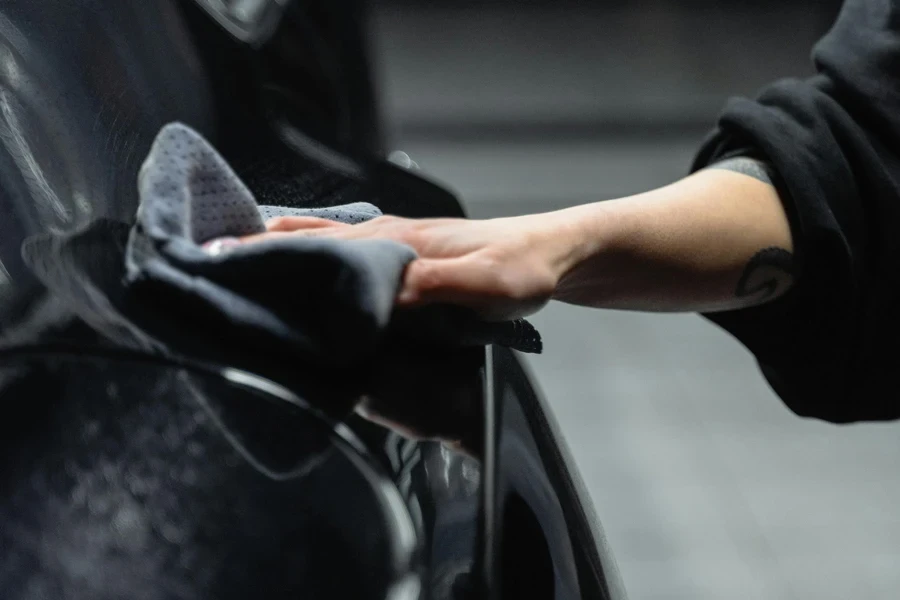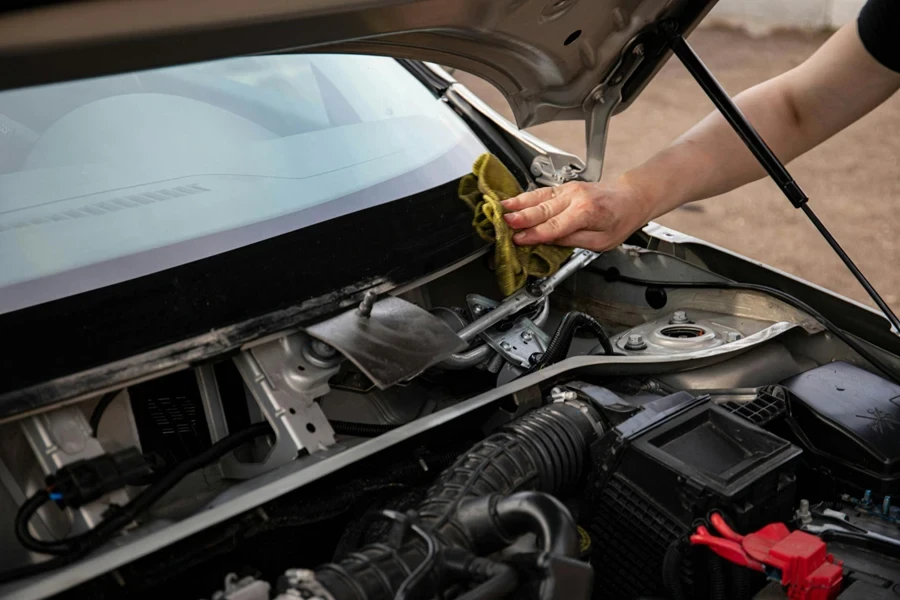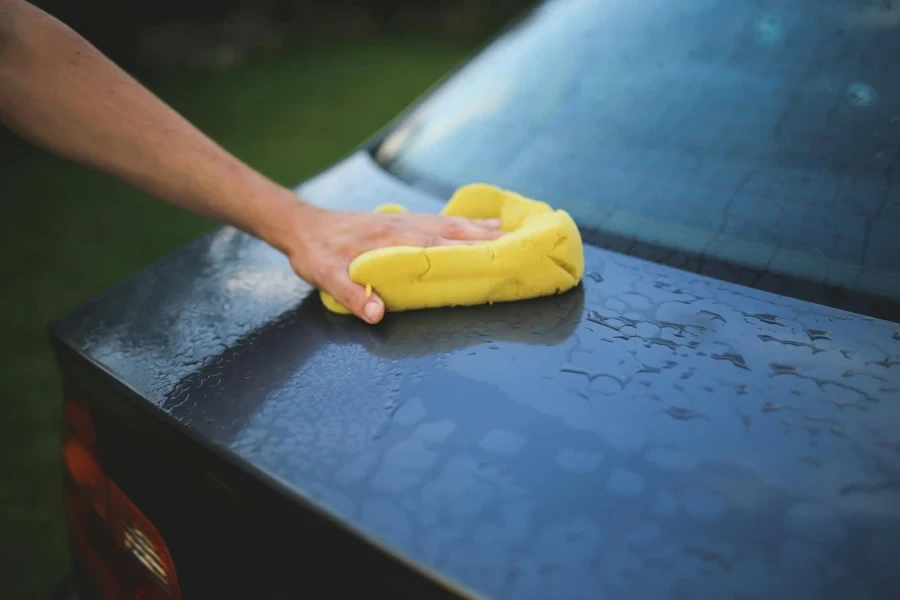Table of Contents
● Introduction
● Market overview
● Different types and their features
● Things to consider when selecting products
● Conclusion
Introduction

Choosing the right car wash towel is crucial for maintaining a vehicle’s pristine appearance and protecting its delicate surfaces. High-quality towels, especially those made of microfiber, offer superior absorbency, effectively capture dirt and dust, and reduce the risk of scratches. The market’s shift towards eco-friendly materials and innovative designs has further enhanced their efficiency and sustainability. Understanding the different types of car wash towels and their specific uses ensures optimal results in automotive care. This guide delves into market insights, types, and selection tips to help businesses make informed decisions.
Market overview

Market scale and growth
The microfiber cleaning towel market was valued at USD 801 million in 2019 and is projected to reach USD 950.2 million by 2030, growing at a compound annual growth rate (CAGR) of 4.2% from 2024 to 2030. The market expansion is driven by the superior cleaning qualities of microfiber towels, their durability, and the increasing demand for eco-friendly products. Improvements in manufacturing processes and a growing awareness of hygiene standards also contribute significantly to this market’s growth.
The market is witnessing a shift towards eco-friendly and sustainable materials. Consumers are increasingly opting for towels made from recycled polyester, plant-based fibers, and bamboo blends. This trend aligns with global regulations aimed at reducing single-use plastics. Innovations in microfiber technology, such as the incorporation of antimicrobial agents like copper threads and silver ions, are also emerging.
Different types and their features

Window towels
Window towels are typically composed of high-quality cotton, known for its superior absorbency and lint-free properties. These towels are specifically designed to clean windows without leaving streaks or scratches. Cotton’s natural softness ensures that the glass remains spotless, enhancing both visibility and overall aesthetics. These towels often feature a tight weave to prevent any lint from being left behind, making them ideal for achieving a crystal-clear finish on automotive glass.
Terry cloth towels
Terry cloth towels are crafted from looped cotton fabric, which gives them a highly absorbent texture. These towels are primarily used for applying car wax due to their ability to hold and evenly distribute the wax across the vehicle’s surface. While they can sometimes leave lint, the looped design helps in maintaining consistent application. Terry cloth towels are often preferred for their durability and ability to withstand repeated use and washing, making them a reliable choice for waxing tasks.
Washing mitts
Washing mitts are made from a combination of cotton and synthetic fibers, featuring long, fine fibers that efficiently grip dirt and lift it away from the car’s surface. This design minimizes the risk of scratches and swirl marks. The mitts often have a thick, plush construction that allows for deep cleaning while being gentle on the paint. Frequent rinsing is essential to remove trapped debris and prevent it from causing damage. Washing mitts are ergonomically designed to fit over the hand, providing better control and ease of use during the washing process.
Microfiber wash cloths
Microfiber wash cloths are made from a blend of polyester (usually around 70%) and polyamide (30%), offering a high level of absorbency and dirt-trapping ability. The fibers are incredibly fine, often 1/100th the diameter of a human hair, which allows the cloths to pick up even the smallest particles of dirt and dust. These cloths can absorb up to eight times their weight in liquid, making them ideal for both cleaning and drying tasks. The split fibers create a larger surface area and a positive charge that attracts and holds onto debris, ensuring thorough cleaning without scratching.
Polishing towels
Polishing towels are crafted from specialized microfiber, designed to achieve a high-gloss, swirl-free finish. These towels typically have a dense, low-pile weave that ensures even pressure distribution during polishing, enhancing the shine and depth of the paint. The fine fibers help to lock in any residual polish or wax, preventing streaks and smears. Polishing towels are also highly durable, capable of withstanding numerous wash cycles without losing their effectiveness, making them a valuable tool for maintaining a car’s finish.
Chamois wash cloths
Chamois wash cloths are made from genuine or synthetic chamois leather, known for its exceptional softness and absorbency. These cloths are ideal for drying a vehicle after washing, as they can quickly absorb water and leave a streak-free finish. Chamois cloths are designed to be used damp, which allows them to glide smoothly over surfaces without scratching. Their unique structure enables them to hold a significant amount of water, reducing the number of passes needed to dry the car completely. Chamois wash cloths are also highly durable, often lasting for years with proper care.
Things to consider when selecting products

Material composition
When selecting car wash towels, the blend of materials used is crucial. A combination of polyester and polyamide is ideal, typically in a ratio of 70% polyester to 30% polyamide. This blend ensures that the towel is both highly absorbent and effective at trapping dirt. Polyester provides durability and scrubbing power, while polyamide enhances the towel’s ability to absorb liquids and remove dirt from surfaces. The microfiber’s ability to pick up particles as small as bacteria makes it highly effective for car detailing tasks.
Ideal GSM (grams per square meter) for different tasks
The GSM of a towel indicates its density and thickness, which are important for determining its suitability for various tasks. For general car cleaning, a GSM of 300-400 is recommended, as it offers a good balance between absorbency and ease of handling. Towels with a higher GSM, such as 600-800, are thicker and more plush, making them ideal for drying and polishing tasks where a gentle touch is required to avoid scratching. Lower GSM towels, around 200-250, are suitable for tasks like applying wax or cleaning less delicate areas.
Durability and maintenance
Proper care is essential to extend the lifespan of microfiber towels and maintain their performance. It is important to wash microfiber towels separately from other fabrics to prevent lint transfer. Use a mild detergent without fabric softeners, as softeners can clog the fibers and reduce their effectiveness. Washing in warm water helps to remove residues like wax and polish. Air drying is preferable to prevent heat damage, but if using a dryer, set it to low heat. Storing towels in airtight containers or sealed plastic bags helps keep them clean and ready for use.
Tips for washing, drying, and storing towels
Regular cleaning of microfiber towels is necessary to maintain their cleaning efficiency. Before first use, remove any tags or labels to avoid scratches. After each use, rinse towels thoroughly to remove any trapped dirt and debris. For heavily soiled towels, pre-soak in a microfiber detergent solution. When washing, choose a gentle cycle and avoid using bleach or fabric softeners. Air drying is the safest method, but if using a dryer, opt for a low-heat setting. Proper storage in a clean, dry place ensures the towels remain uncontaminated and ready for the next use.
Features to look for in good quality towels
High-quality microfiber towels should have a high blend of polyester and polyamide, typically in the recommended 70/30 ratio. Look for towels with a higher GSM for tasks requiring more absorbency and gentleness. Edgeless designs and ultrasonic cutting help prevent scratches, making them safer for sensitive surfaces. Towels should be soft to the touch but durable enough to withstand multiple washings. Investing in well-known brands that specialize in automotive detailing can also ensure a higher standard of quality and performance.
Conclusion

Choosing the right car wash towels is essential for maintaining a vehicle’s appearance and ensuring optimal care. Good quality towels, particularly those made from a blend of polyester and polyamide, offer superior absorbency and dirt-trapping capabilities while minimizing the risk of scratches. Understanding the specific uses and features of different types of towels, such as window towels, terry cloths, and microfiber cloths, enhances their effectiveness. Proper maintenance, including correct washing, drying, and storage, extends the lifespan of these towels and maintains their performance. Investing in the right car wash towels and caring for them appropriately ensures vehicles remain in pristine condition, ultimately benefiting businesses in the automotive detailing industry.



